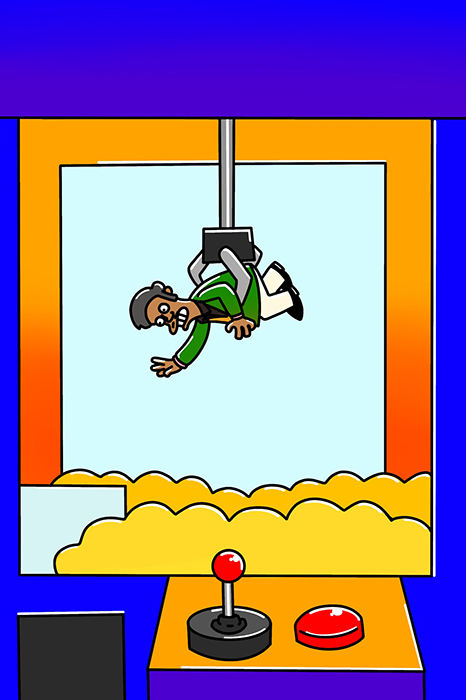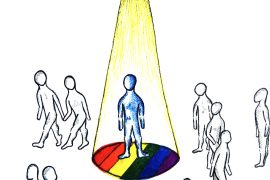Satire is what The Simpsons is all about. It is what the show prides itself in doing. The Simpsons stands on pillars of satire and comical stereotyping. We have Homer, a rather dull man with a steady job, father of three and husband to Marge. Bart Simpson is the mischievous trouble-maker pulling pranks while his sister Lisa is the perfect model student. All of these characters are comical stereotypes and it’s the jokes about them that make the show great.
The Simpsons has a lot of characters, many of which are featured frequently. Like the Simpsons family, they are all comedic satirical stereotypes, from Luigi the “Italian chef” parody, to Police Chief Clancy Wiggum, who represents a semi-corrupt policeman, often taking bribes. Apu—who was the centre of a modern problem for The Simpsons—is no exception to the standard modelling of the characters in the show. If you go to The Simpsons website, Apu can be found in the character section, under his full name: Dr. Apu Nahasapeemapetilon, Ph.D. Jr. He is described as the owner of the Kwik-E-Mart, which is a local convenience store. Apu came from India and is highly educated, holding a Ph.D. in computer science. He appears to be a favourite amongst the extra characters, since many sketches involve the Kwik-E-Mart. Apu’s constant featuring is also an example of inclusion in The Simpsons—for a show that makes fun of everyone.
The episode, “Much Apu About Nothing” that aired on May 5, 1996 is an example of Apu’s relevance. The episode focused on the Mayor’s proposition to deport all illegal immigrants. Apu confides in Homer that he has been living with an expired visa. Initially, Homer sympathizes but declines to help Apu. Homer is later seen in a bar with his friends Moe and Barney, preparing banners in support of the proposition. The dialogue in this scene is comedic as well as relevant. “You know what really aggravazes me? It’s them immigants (sic),” says Moe. “They wants all the benefits of living in Springfield, but they ain’t even bother to learn themselves the language.” Homer replies, “Hey, those are exactly my sentimonies.” The hypocrisy is stunning.
In the end, Homer and his family helps Apu prepare and pass the citizenship test. The dialogue in the bar scene provides a very clear contrast when compared to Apu’s citizenship interview dialogue, where the test’s proctor is asking him about the causes of the civil war: “Actually, there were numerous causes,” he says when questioned. “Aside from the obvious schism between the abolitionists and the anti-abolitionists, there were economic factors, both domestic and inter—” and then the proctor saying: “Wait, wait…just say slavery.” Apu is respected and showcased here. He acts as an icon of immigration and of how immigrants interact with non-immigrants. Without Apu, there would be no convenience store scenes, but there would also be no spokesperson for this particular group. Apu adds diversity to the voices present in The Simpsons.
Regrettably, in 2017, a comedian by the name Hari Kondabolu made a documentary called The Problem with Apu about how the character is widely considered to be an offensive stereotype to people of Indian and Asian descent. The film seems to focus on negative stereotyping, forcefully aligning examples with Apu. This sparked a media storm and brought The Simpsons back into the spotlight for the wrong reasons. It is regrettable that Apu was targeted this way, because the stereotypes he represents are stressed to the same degree as all the other characters in the show. In fact, The Simpsons has held Apu in higher standards than some of the other characters. If one is a dedicated viewer of The Simpsons, it becomes easy to identify that Apu is more charismatic, educated, and sophisticated than many of the American characters. Again, like all the characters on the show, Apu is balanced with positive and negative qualities. I tend to agree with Matt Groening, the creator of The Simpsons, when he said, “I’m proud of what we do on the show. And I think it’s a time in our culture where people love to pretend they’re offended.”
I am an avid fan of The Simpsons. The experience watching it as a child is very different than watching it as an adult. As a child, it’s just entertaining to watch Homer get stung by bees or watching a lie detector machine blow up when an FBI agent is interrogating him. However, when watching as an adult, the comedy is enriched by further cultural context. Author Jonathan Gray’s book Watching with The Simpsons: Television, Parody, and Intertextuality is an excellent read for those who want to dive further into the comedy of The Simpsons and understand it better.
In the week leading up to The Simpsons’ 26th season premiere, Gray was interviewed by Wes Unruh from The Peabody Awards. During the interview, Unruh mentioned how the show features many racial, religious, ethnic, and class stereotypes, some of which are intentionally offensive and asked, “Are there aspects unique to The Simpsons, which has enabled hyper-stereotyping to be as effective at subverting stereotypes?” Gray’s response was, “I wouldn’t say The Simpsons has done this better than most, especially since many of their hyper-stereotypes appear so fleetingly, whereas I can think of many shows that engage hyper-stereotypes with a lot more depth and focus (Key and Peele or Inside Amy Schumer right now, for instance). But it’s also better than others.” Gray further explained the benefit animation brings to this argument—allowing things to be starkly drawn both figuratively and literally. “Animation is always already coded for viewers as not real, as larger than life, and thus the rather dangerous, tricky strategy of hyper-stereotyping enjoys certain benefits in this realm,” he says. This statement also highlights the problem of Kondabolu’s perspective. It is important to remember that nothing in The Simpsons is real. They are all caricatures.
I honestly find the stir-up created by Kondabolu as one-sided. If racial profiling or stereotyping is the issue, it must be addressed more broadly and without bias. I would have loved to see a joint rebellion regarding all of the characters that The Simpsons uses as stereotypes, like Waylon Smithers—a gay man working as a personal assistant who always has his sexuality stressed but rarely addressed; Fat Tony—head of an organized crime ring where everyone is Italian; the Flanders family—where everyone is God-loving and Ned Flanders, the head of the family, has become an evangelical stereotype. The documentary should have included people with Italian heritage, Christians, and members of the LGBTQ+ community. It seems personal, and the “fighting for a cause” attitude seems exceedingly fake. Kondabolu’s sole picking of Apu, therefore, seems illogical. Why just pick one character? If one was being crudely analytical, one would think that this was the attempt of a struggling comedian to desperately reach out to the media and forcefully advertise himself.
As it stands today, The Simpsons, previously streamed on Fox, will now exclusively be streamed on Disney+, after Disney’s acquisition of 21st Century Fox. Matt Groening has confirmed in an announcement during Disney’s D23 Expo that Apu will continue to feature in The Simpsons.
A hardworking family man, Apu is well established and is financially solvent—a very well-liked character. Therefore, when he was picked out to create a controversy, to me, it felt like picking out a bent nail from a building in construction and starting an unnecessary row with the contractor. To reiterate Matt Groening’s response, he should be proud of the show and its characters. I believe that using Apu and racism to create a bit of fame for oneself, not to mention a contract from Netflix, cheapens the seriousness of racism.





